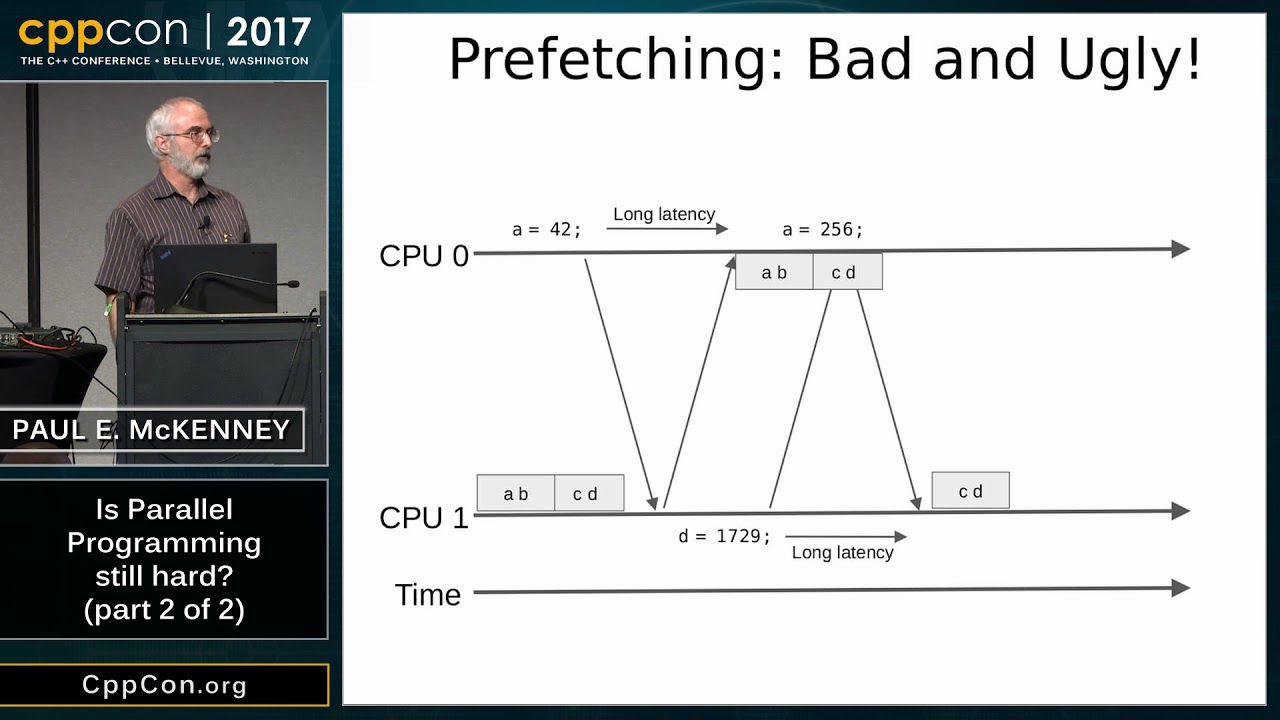http://CppCon.org
—
Presentation Slides, PDFs, Source Code and other presenter materials are available at: https://github.com/CppCon/CppCon2017
—
Most embedded devices are multicore, and we see concurrency becoming ubiquitous for machine learning, machine vision, and self-driving cars. Thus the age of concurrency is upon us, so whether you like it or not, concurrency is now just part of the job. It is therefore time to stop being concurrency cowards and start on the path towards producing high-quality high-performance highly scalable concurrent software artifacts. After all, there was a time when sequential programming was considered mind-crushingly hard: In fact, in the late 1970s, Paul attended a talk where none other than Edsger Dijkstra argued, and not without reason, that programmers could not be trusted to correctly code simple sequential loops. However, these long-past perilous programming pitfalls are now easily avoided with improved programming models, heuristics, and tools. We firmly believe that concurrent and parallel programming will make this same transition. This talk will help you do just that.
Besides, after more than a decade since the end of the hardware “free lunch”, why should parallel programming still be hard?
—
Paul E. McKenney: IBM Linux Technology Center, Distinguished Engineer
Paul E. McKenney has been coding for almost four decades, more than half of that on parallel hardware, where his work has earned him a reputation among some as a flaming heretic. Over the past decade, Paul has been an IBM Distinguished Engineer at the IBM Linux Technology Center. Paul maintains the RCU implementation within the Linux kernel, where the variety of workloads present highly entertaining performance, scalability, real-time response, and energy-efficiency challenges. Prior to that, he worked on the DYNIX/ptx kernel at Sequent, and prior to that on packet-radio and Internet protocols (but long before it was polite to mention Internet at cocktail parties), system administration, business applications, and real-time systems. His hobbies include what passes for running at his age along with the usual house-wife-and-kids habit.
Maged Michael: Facebook, Engineer
Maged Michael is a software engineer at Facebook. He is the inventor of hazard pointers, lock-free malloc and several algorithms for concurrent data structures. His work is included in several IBM products where he was a Research Staff Member at the IBM T.J. Watson Research Center. He received a Ph.D. in computer science from the University of Rochester. He is an ACM Distinguished Scientist and an ACM Distinguished Speaker. He is an elected member of the Connecticut Academy of Science and Engineering. He received the 2014 ACM SIGPLAN Most Influential PLDI Paper Award for his paper on Scalable Lock-Free Dynamic Memory Allocation.
Michael Wong: Codeplay, VP Research & Development
Michael Wong is VP of R&D at Codeplay Software. He is a current Director and VP of ISOCPP , and a senior member of the C++ Standards Committee with more then 15 years of experience.
He chairs the WG21 SG5 Transactional Memory and SG14 Games Development/Low Latency/Financials C++ groups and is the co-author of a number C++/OpenMP/Transactional memory features including generalized attributes, user-defined literals, inheriting constructors, weakly ordered memory models, and explicit conversion operators. He has published numerous research papers and is the author of a book on C++11. He has been in invited speaker and keynote at numerous conferences.
He is currently the editor of SG1 Concurrency TS and SG5 Transactional Memory TS. He is also the Chair of the SYCL standard and all Programming Languages for Standards Council of Canada.
Previously, he was CEO of OpenMP involved with taking OpenMP toward Accelerator support and the Technical Strategy Architect responsible for moving IBM’s compilers to Clang/LLVM after leading IBM’s XL C++ compiler team.
—
Videos Filmed & Edited by Bash Films: http://www.BashFilms.com
*—–*
Register Now For CppCon 2022: https://cppcon.org/registration/
*—–*



Comments